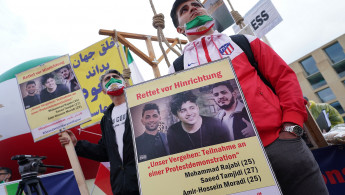Iran court to retry three men sentenced to death over protests
Iran's supreme court said on Saturday that it will review the cases of three young men sentenced to death over links to November 2019 protests after a request from their lawyers.
The protests were brutally suppressed by Iranian security forces and scores of people were killed.
Numerous calls had spread online after the verdict was announced, calling for a halt for executions in Iran, with the United Nations and European countries reaffirming their opposition to the death sentence.
In July, Iran's judiciary halted the death sentences against the three a week after they were upheld by a tribunal over evidence the judiciary said was found on their phones of them setting alight banks, buses and public buildings during the wave of anti-government protests.
Read more: #Don't_Execute: viral campaign to stop Iran protester hangings
"A request to retry the three sentenced to death over the [November 2019] incidents was accepted," the supreme court said on its official website.
"The case will be reviewed in another tribunal," it added, without elaborating further on the decision.
Four lawyers representing the accused made the request days after the young men's sentences were upheld in July, local media said at the time.
One of the lawyers identified the three as 26-year-old retain worker Amirhossein Moradi, Said Tamjidi, a 28-year-old driver for Snapp (Iran's Uber), and Mohammad Rajabi, also 26 and unemployed. All the men were friends.
They were sentenced over "collusion to endanger national security" and "destroying and setting fire to public property with the aim of confronting the political system of the Islamic republic," Babak Paknia, who represents Moradi, told AFP in an interview in July.
Paknia confirmed the supreme court's decision in a tweet on Saturday.
The demonstrations erupted in November last year after authorities more than doubled fuel prices overnight, exacerbating economic hardship in the sanctions-hit country.
They rocked a handful of cities before spreading to at least 100 urban centres across Iran.
Petrol pumps were torched, police stations attacked and shops looted before security forces stepped in amid a near-total internet blackout.
London-based rights group Amnesty International put the number of deaths at 304, including 23 minors, and a group of independent UN rights experts said last year that 400 could have been killed.
Amnesty International blamed Iranian security forces for the vast majority of the deaths.
A senior Iranian lawmaker in June put the death toll at 230 but said most were killed by armed "rioters," months after authorities had refused to provide casualty figures.
Follow us on Facebook, Twitter and Instagram to stay connected





 Follow the Middle East's top stories in English at The New Arab on Google News
Follow the Middle East's top stories in English at The New Arab on Google News


